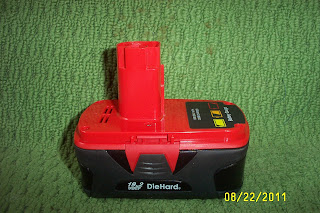I rebuilt a Dewalt battery from a customer in Pennsylvania who was preparing to re roof a large historical barn. His interest was to make sure he had enough batteries available to minimise his accent and decent from the roof 60' from the ground.
He shipped me his case and I rebuilt it to OEM spec and shipped it back to him. Within a few days he emailed me that he could not charge the new rebuild. Dewalt produced a fairly common battery for their tools and rebuilds are straight forward.
He asked if he could ship it back but I suggested that I would rebuild another pack for him and quickly get it to him allowing him to return the other back at his convenience. If that was the end of the story I would not have posted these details. He emailed me when he received the new rebuild that he could not charge either battery.
I reminded him that as far as I knew, Dewalt had only used two NI-CD chemistry's in there battery history and unless he had a "Univolt" system he should be getting the job done. The battery he sent me was not for a univolt system so I assumed that was not possible.
The next day he notified me that he had communicated with Dewalt and they sent him to their factory rep for suggestions.
The following is his report.
Ernie,
I went to a nearby shop to get help on my charging problem.
Suffice to say, this guy knows his batteries. What he told me, and showed to me, made everything clear: First of all, there is no amount of rewiring...or any other modifications, that can make your 2300-mAh batteries charge on any of my chargers. All of my chargers were built and sold in the days of 1300-mAh and 2000-mAh (max capacity) batteries. The reason they will not charge is because my old chargers run a short diagnostic to determine if the batteries have any problems (dead-shorts and/or open or damaged cells). The 2300-mAh batteries you use in your packs have an internal impedance which is simply out-of-tolerance for my chargers. Therefore, no amount of rewiring is going to correct the problem. Besides, there is only one way to wire these 12 sub-C cells in order to get 14.4 volts. And, by the way, Mr. Lyons complemented you on the quality of your work. He was impressed with your welding and the cell arrangement. So, bottom line, there is no way that these two rebuilt packs can be recharged with any of my old chargers...because they were not built to the original specifications of the old DW9091 and B&D 97152 batteries. Lyons then showed me that the Dewalt DW9116 charger will charge all of my batteries; my old ones and both of the batteries you have rebuilt. The DW9116 has the largest acceptable test range, so it will charge everything from 1300-mAh to 2400-mAh batteries. Incidentally, your DC9310 charger also has a rather wide acceptability range, but Lyons thinks it may not go all the way down to the impedance of the 1100-mAh cells B&D originally used. This knowledge cost me $56.85...$33.63 for a new-old-stock DW9116 charger and $20 for taking apart your second rebuilt battery, checking the construction, and putting it back together, and PA sales tax.
So now I have what I need to get started on the barn (which we are planning to start tomorrow morning). Since I am not particularly happy in having to spend $107.12 (for the first rebuilt battery, new charger, consultation, and extra postage) for one battery, I would like you to let me know how much I owe you for the second rebuild, I'll Paypal you the payment, and we can call it knowledge gained.
Lance
The moral to this story is, "If you are looking for new parts or updating old systems ask all the questions you can think of". before ordering.








